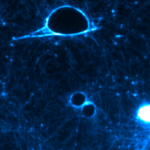About
Bacterial protein toxins are molecular nanodevices endowed with the capacity of inducing host specific unparalleled pathophysiological effects. Therefore, major challenges in toxinology include the development of countermeasures other than vaccination against bacterial protein toxins to fight deadly symptoms. Indeed, vaccination shows technical limitations considering the wide range of toxins and their variants and is ethically not justified in the case rare infections or against toxins used as pharmaceutical agent, such as neurotoxins from Clostridium botulinum. Besides, Botulinum neurotoxins (BoNT) are known as the most toxic agents for humans in the world and represent a risk of misuse. Therefore it is of major concern to develop highly efficient methods of BoNTs detection and develop countermeasures against this group of bacterial toxins.
In this context, we study chemical inhibitors with broad spectrum of action on toxins and acting on host vesicular trafficking. This original strategy initially developed by our colleagues and collaborators (Stechmann 2010 Cell) offers the possibility to overcome problems of selection of antibiotic resistant pathogens without interfering on the microbiota, which is a key requisite in the maintenance of our health. We have established a network of multidisciplinary collaborations to study a family of chemical compounds selected for their capacity to protect cells against a large number of bacterial toxins of civil and military concern. This shall also contribute to the race of developing new strategies aiming at disarming pathogens multi-resistant to antibiotics.
By studying neurotoxins we also contribute to the development of standard analysis tools and detection procedures within the frame of the European consortium EuroBioTox https://eurobiotox.eu/eurobiotox_project/index.html.








